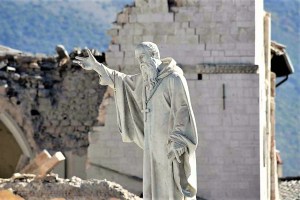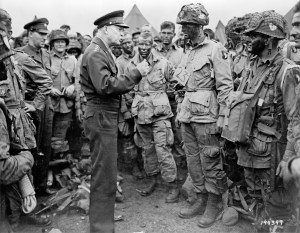We support our Publishers and Content Creators. You can view this story on their website by CLICKING HERE.
I could see down below the mountain path a lone figure coming up, dressed in a brown cloak and with a walking stick. It was a wandering monk, who introduced himself simply as Brother Anthony and plopped himself down. He had no weariness in his heart and soul, or so it seemed to me. This little incident has long remained in my mind as a sort of parable, which is by its nature a mystery.
Ellen Frances dropped me off at Sam’s Gap, just off Interstate 26 and north of Asheville, North Carolina. She took a picture of me and Becky, the dog, as we crossed over the road to a fence and a small opening between two fence poles. We squeezed through and waved good-bye and began this little thing on the proverbial bucket list.
And that was that, on the “Trail,” and something I had thought of doing for some time and will do again when the weather cools a bit.
From Sam’s Gap, then, I would be hiking north by east for about three-and-a half days, up and down, toward Erwin, Tennessee, across the bridge spanning the Nolichucky River and then south along the river before east again to Indian Grave Gap and where she would meet me, my wife, Ellen Frances.
Wise though to know some things before setting out. The Nolichucky, for example, is thought to be a “bastardized” pronunciation of a Cherokee word, or so think some. It flows mostly west and then a bit south joining the French Broad close to Knoxville. You might be interested in knowing that Davy Crockett was born along that river. And it has some interesting history including some Cherokee wars, with a faction called the Chickamaugas, and some Civil War history, including a short hike to Lost Cover, now a ghost town. Three houses remain, as does a rusted Chevy. I learned this from a nice, long chat with Charlotte at Uncle Johnny’s Nolichucky Hostel. The river, by the way, is a class four whitewater river in places.
But the AT is less a trail and more a path, and if anyone came to my door and asked for advice I would give them some.
Don’t be naive.
Be in very good shape—legs, shoulders, heart, lungs—because it’s a stress test, and a good one.
Lighten your pack, but pack as much as you think you need, and then do everything you can to travel light. It’s an adventure, for sure, but the hike itself is moderate to stressful, very stressful.
Right now as I’m writing this my pack is down to seventeen pounds, ten pounds less than when I began this leg of the hike.
It’s learned from experience, but if you go, set a pace you can live with, and don’t worry about the military types who may come up behind you and speed on by like some madcap in a sporty car on a highway.
Say, “Have a good hike.” Everybody does.
There are some who speed-hike the thing and there are others, like the 75 year-old grandmother and grandson who started the trail in northern Georgia and were on their way to Maine, thinking to be there in mid-October. They were a happy pair, and they have my blessing. They were smiling. We hiked a bit together before they took a side trail to rest and replenish.
But when alone there were times I wondered about my sanity, the drop-offs to one side or another, the mud, the rocks and roots, the switch-backs, the dankness and tunneled-closed-in feeling, bees in profusion in the sweet-smelling mountain laurel. To stop and re-consult the map again and wonder about distance. It’s a bit like an allegory in the making, one might say, even if I’m at a remove from that mid-way journey of my life.
One might not think of the business as being so, but the forest is deciduous and deep and very often imposing. And then another very steep climb, nearly a full mile, and over 600 feet to an opening and then across a “bald.” More so because the paths are eroded, but there are moments in which gaps in the trees allow one to see I-26 meandering through the mountains.
And then, after difficult terrain, something more moderate for a bit with openings in the forest canopy, and I could see far and away, gorgeous views of those mountains, stretching and then stretching again and again.
I had emerged onto a grassy area, no trees, and a narrow, twisty path with a moderately steep grade and the summit of Big Bald, 5516 feet, straddling North Carolina and Tennessee, and a 360 degree panorama.
And a bit tired. Enough for the day, and just as I had planned.
I’ve learned some things after the fact: the word “meanderthal,” is an urban dictionary term applied to slow moving people either on sidewalks or the type of person who “hikes” slowly through grocery stores and always leaves a cart in the middle of an aisle. You meet a few of these folks on the AT. A few, including me, I guess.
My pack was off and next to me. And I had taken Becky’s saddle bag pack off to give her a rest. We sat there in the tall grass for a good period of time before making camp now late afternoon. She got up and gave out a “woof” and I could see down below a lone figure coming up from a different direction. Slowly, and then I could see dressed in something like a brown cloak and with a walking stick. I thought, “oh my, a beggar.”
But it wasn’t; it was a wandering monk, single and solitary, an ascetic, and as God is my witness, introduced himself simply as Brother Anthony with, then, or I suppose, no last name. And plopped himself down.
One might think he would be Catholic or Buddhist and begin by saying something like how the Tao burns, but he wasn’t Catholic or Buddhist. He was Lutheran and remember that we are sitting on the top of Big Bald, 5516 feet, straddling North Carolina and Tennessee, and as it turns out he’s from Oxford, Michigan, and had been, for a bit, a resident or novice of St. Augustine’s House in Oxford, a Benedictine Lutheran monastery, and he was in a period of formation before becoming—get this—a member of the Order of Lutheran Franciscans, and thus an evangelical.
And so a little brother.
And probably not a “monk” but more likely an itinerant “friar.”
But why “Big Bald”?
Well, up high and since he intended to stay the night, a place among many places to encounter God, to experience and savor God’s gift of creation. I knew some of this, knew that Franciscan spirituality is openness to God and belief that all of creation is the place to encounter God by living more simply on the earth, and living in attentive contact with the world in the world’s most simple and humble state.
And he liked dogs, and Becky meandered over for a rub and a pet and a scratch and to give the guy a smooch on the cheek. And quick lick on the ear.
The sun was then at last making its way down, the last rays, and the sky deepening in blue, darkening. There was an air of self-conscious solitude, mostly on my part, the self-consciousness, inveterate shyness. Something about this that seemed freakish, I should say, or think, especially as the evening’s time extended itself and my mind so accustomed to screwing itself down inside myself uneasy as I was with this company.
I decided to stand and look into the darkening vista; one lone hawk floated above and then sailed down to settle in the trees down below. My friar friend leaned himself back and arranged his brownish cloak cozily.
And then with what I now understand as the most simple piety said, “Oh Heavenly Father, thank You for the light which if it had sound would tumble around us with the sound a grand organ makes, purling and retreating, ruddy-footed, and for this night air and the stars that will soon appear like questions.”
“And thank you for this man and his fine dog.”
My brain felt no bigger than a small pebble, and my whole life seemed to own little more than doggedness, imaginative energy directed inward rather than outward.
I took my little Jet Boil from my pack and and boiled some water. The dehydrated meal was chicken and dumplings, enough for two. As the thing steeped I fed Becky and gave her some water. My friar friend was watching me, and then, from inside this little shoulder-like bag he was carrying, he pulled out a bowl and a spoon.
And he said, “Let’s eat.”
I wonder if in life it’s possible to achieve such clarity that the past and future no longer exist as part of our daily lives. Would we be more large-souled if we no longer devoted our lives to all the abstractions around us, which might include words like faith or belief.
We ate, and let time pass quietly over head.
And slept soundly.
I made coffee in the morning.
We shook hands, and he left following the way I had come.
Becky and I packed up but then sat there for awhile looking at the path, “the way” our wandering friar had come.
This “thing” broods with me these days since my intelligence is relentlessly suspicious, but my imagination—which I hope is broad, humane, and moral—hopes never to harden this “thing” which questions me wonderfully in itinerate ways.
Anthony had no weariness in his heart and soul, or so it seemed to me. And I could not tell how old he was. And to this day I find it hard to regard him as something much more than an experiment in simplicity… and by that I do not mean stupidity.
It’s been a half-dozen years or so since I made my first hike on the AT, but this little incident has long remained in my mind as a sort of parable, which is by its nature a mystery.
—From a memoir in progress, “The Man Who Wore A Tea Cup On His Head.” See also: “Confessions of a Meanderthal.”
The Imaginative Conservative applies the principle of appreciation to the discussion of culture and politics—we approach dialogue with magnanimity rather than with mere civility. Will you help us remain a refreshing oasis in the increasingly contentious arena of modern discourse? Please consider donating now.
The featured image is courtesy of Pixabay.

 Conservative
Conservative  Search
Search Trending
Trending Current News
Current News 






